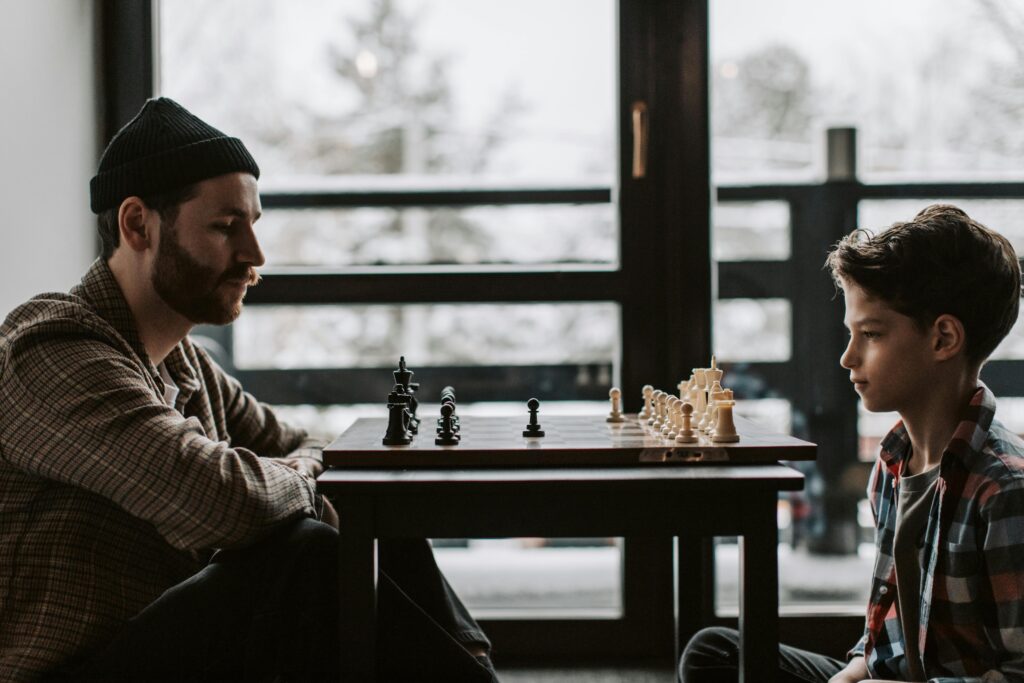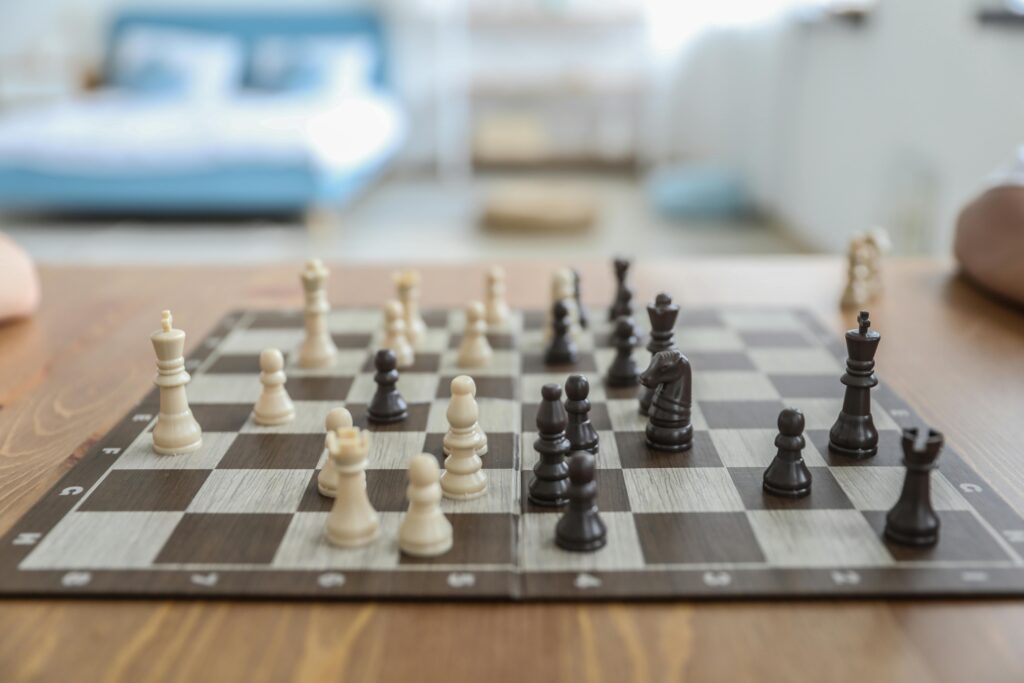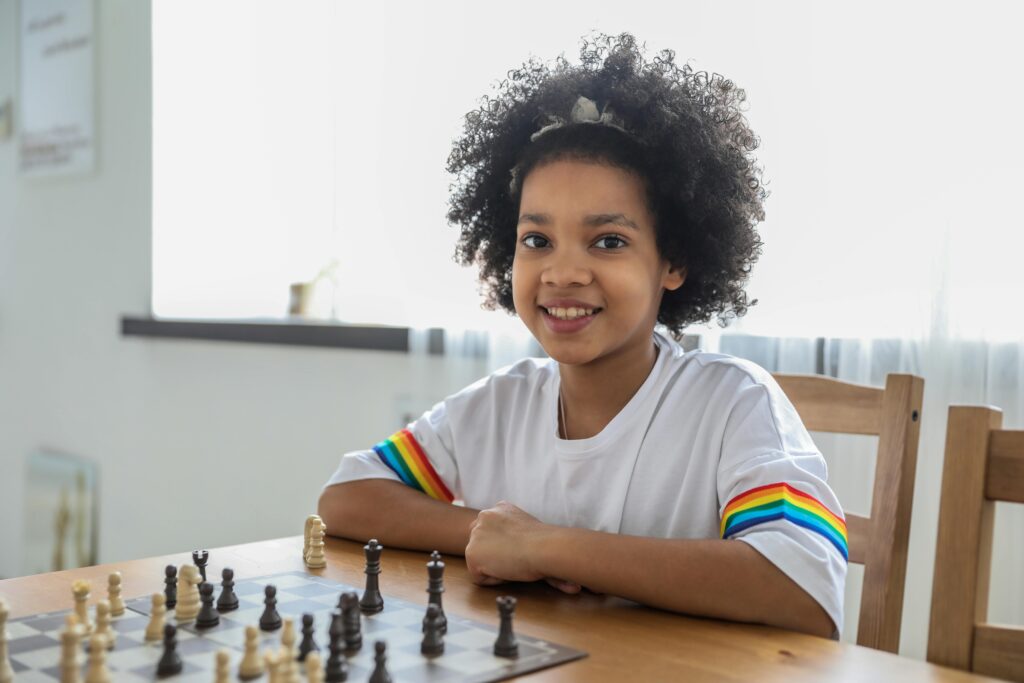Roundhay is a lovely part of Leeds. It’s green, it’s quiet, and it’s full of curious young minds. Many parents here are always looking for new ways to help their kids grow. One of the smartest things you can do for your child is to teach them chess. But not just any kind of chess — we’re talking about guided learning, with expert coaches who truly care
Online Chess Training
Landscape of Chess Training in Roundhay and Why Online Chess Training is the Right Choice
In Roundhay, Leeds, you’ll find many ways for kids to learn and grow. There are great schools, lovely parks, and even a few clubs here and there that teach chess. But when it comes to serious chess learning, something is missing.
You see, most local chess programs don’t follow a plan. Some meet once a week. Some don’t even have real coaches. It can feel like your child is just moving pieces around without knowing why they’re doing it.
Now, let’s be honest — we live in a digital world. Kids are already learning online, doing homework online, and playing games online. Why not use this to help them grow their brain with chess? That’s where online chess training steps in and changes everything.
Online chess training isn’t just about playing on a screen. It’s about learning from top coaches who understand how kids think and learn. It’s about having a path, a plan, and a goal. Good online chess programs don’t just teach chess — they teach focus, patience, and problem-solving. And the best part? Your child can learn right from your living room.
Here in Roundhay, you may not always find the right coach nearby. Maybe the timings don’t work. Maybe the group is too big, or the pace is too slow. But with online training, your child gets one-on-one time, live feedback, and interactive classes that actually keep them interested.
More and more families in Leeds — and even around the world — are choosing online chess classes for their kids. And not just because of convenience. They’re choosing it because it works. Kids improve faster. They get more attention. And they actually start to love learning.
Let’s now talk about the leader in this space — the school that is not only doing online chess right but making it fun, personal, and powerful: Global School of Chess.
How Global School of Chess is the Best Choice When It Comes to Chess Training in Roundhay
Here’s the truth: Global School of Chess is not just another chess academy. It’s a full learning experience.
While most programs give you a class and say goodbye, Global School of Chess gives your child a journey. Our coaches are not just chess players — they’re trained teachers. Every lesson is built around your child’s level.
If they’re a beginner, we take it slow. If they’re a little ahead, we challenge them in just the right way. We don’t believe in one-size-fits-all.
We use a special curriculum that’s been built by chess masters. It’s not just random games. Every class builds on the last one. Your child learns openings, middlegame strategies, and how to checkmate like a pro. They even learn how to stay calm under pressure, how to spot patterns, and how to plan their next move — in chess and in life.
Global School of Chess also offers bi-weekly online tournaments, so your child can put their new skills to the test. These aren’t just games — they’re real events, with other smart kids from across the globe. It gives students confidence, teaches sportsmanship, and helps them grow.
We also work with students from more than nine countries across four continents. That’s not just a number — that’s a global classroom. Your child learns how to think big, dream big, and see chess not just as a game, but as a skill for life.
And yes — we offer a free trial class, so you can see it for yourself. No risk. No stress. Just a simple way to find out what makes us so special.
Now that we’ve seen the beauty of online chess learning, let’s take a moment to talk about what most people still choose — offline chess training.
Offline Chess Training
While offline chess training has tradition on its side, it’s facing new challenges in today’s fast-moving world. In places like Roundhay, Leeds, where community is strong and families value real-life connections, chess clubs and in-person classes still hold meaning.
They offer face-to-face learning, a physical chessboard experience, and the charm of human interaction. But to stay relevant and helpful, offline training needs to evolve — especially for the next generation of learners.
So let’s look deeper at how local chess clubs can make offline chess training more valuable and what strategies can help them thrive in the digital age.
Rethink the Club Format
Most offline chess groups meet once a week. That’s a start, but it’s not enough if you’re looking to provide meaningful growth. Children need more structure. Clubs should think about turning casual play into structured learning sessions — with levels, topics, and learning outcomes.
Instead of “free play” for most of the session, offer short, focused lessons at the start. Introduce a new tactic each week — like forks, pins, or openings — then have students practice that tactic in their games. This brings purpose to the play and helps students connect learning to action.
Invest in Curriculum, Not Just Chess Sets
Many offline clubs rely on informal teaching — a coach or experienced player giving advice on the fly. This is fine for casual improvement, but not for long-term progress. If a club wants to grow and retain serious students, it needs to invest in a structured curriculum.
Think of chess like school subjects. You wouldn’t teach math by just handing out calculators. Likewise, a chess club should map out what students will learn in a month, a term, or even a year. Break lessons into beginner, intermediate, and advanced levels. This gives parents confidence and students a sense of achievement.
Embrace Hybrid Models
Offline clubs in Roundhay have a big opportunity: combine the power of in-person meetings with online tools. Offer digital homework, puzzles, or access to game reviews using online platforms like Lichess or Chess.com. Even better, record mini-lesson videos that students can watch between sessions.
This hybrid model not only improves learning — it also shows parents that the club is serious about growth and ready to adapt to the modern learning style.
Create Micro-Tournaments and Milestones
Children love challenges. Instead of waiting for big citywide tournaments, local chess clubs can run micro-competitions every month. These can be short, one-hour blitz events with small prizes or certificates. More importantly, they can be tied to skill achievements — like “Best Checkmate of the Week” or “Most Improved Player.”
Recognition, even in small ways, builds motivation. It also helps with student retention. Kids stay excited. Parents stay involved. And clubs build a strong sense of community.
Partner with Local Schools
One powerful way for offline chess clubs to grow is by partnering with local schools in Roundhay. Many schools want to offer chess but don’t have trained staff. A club can offer to run after-school sessions or weekend chess camps. These can be feeder programs into your main club — helping you reach more students while helping schools expand their extracurricular options.
Offer to run a free demonstration class at schools. Show teachers and parents how chess helps with focus, math, and problem-solving. This kind of outreach turns your club from a hobby into a valuable community resource.
Be Parent-Friendly
Chess clubs that cater to kids often forget the parents. But parents are the ones who sign up, pay, and bring their kids each week. Make their experience smoother.
Provide simple progress updates — even a 3-sentence note every few weeks. Share what their child is learning. Highlight a fun moment. Offer light advice on how parents can support learning at home.
This makes a big impact. When parents feel informed and included, they become long-term supporters of your club.
The Strategic Takeaway
Offline chess training still has great potential — but only if it adapts. Families today are busy, tech-savvy, and results-oriented. Clubs in Roundhay can no longer afford to be informal gathering spots. They need to offer real value, measurable growth, and meaningful experiences.
If you run an offline chess club, think like an educator, not just a player. Build structure. Use tools. Involve parents. Show progress. And if possible, blend the best of both worlds — human connection and digital learning.
By doing this, you not only compete with online academies like the Global School of Chess — you become a unique and valuable option in your own right.
Drawbacks of Offline Chess Training
Let’s be honest — offline chess learning may sound nice, but it comes with a lot of challenges. And if you’re a parent who wants your child to actually grow through chess, these drawbacks matter a lot.
The first big issue is lack of structure. Most offline classes don’t follow a fixed curriculum. One week your child learns about openings, the next week it’s tactics, and then it’s just casual play. There’s no steady path. This means progress is slow and uneven. Your child might enjoy the class, but they’re not really building lasting skills.

Then comes the inconsistent coaching. In many offline groups, the coaches change often. Or the coach may not be trained to teach kids. They might be great players, but not all great players are great teachers. Your child ends up confused, unsure, and possibly even discouraged.
Travel time is another problem. As a parent, you know how hard it is to drive across town after school. It’s time-consuming. Your child is already tired. Fitting in offline classes often feels like squeezing one more thing into an already packed week.
Also, missed classes are gone forever. If your child is sick or you’re out of town, that lesson is lost. There’s no recording. No way to catch up. And if the group moves ahead, your child falls behind.
Lastly, offline classes can’t offer global exposure. Your child plays with the same small group of people every week. They’re not seeing new styles, different strategies, or stronger players. This can limit their growth and confidence.
This is exactly why more and more families in Roundhay — and around the world — are turning to online learning. Not just because it’s convenient. But because it’s better in almost every way.
Now let’s get to the exciting part — the top chess academies in Roundhay. And yes, we’re going to start with the one that’s changing the game completely.
Best Chess Academies in Roundhay
Global School of Chess
Let’s talk about why Global School of Chess is not just the best chess academy in Roundhay — but one of the best you’ll find anywhere.
First, we’re fully online. That’s not a limitation. It’s a superpower. Because online means we can bring together the best chess coaches from around the world, not just whoever happens to live nearby. It means your child can learn from a FIDE-certified coach in India, play against a student in New York, and practice puzzles that are specially designed for their level — all in the same week.

Our classes are live and fully interactive. This is not a video that your child watches alone. This is real-time coaching, with coaches who ask questions, give feedback, and truly care about every student. Every class is built around engagement. We keep things fun, focused, and full of surprises that keep young minds excited.
At Global School of Chess, we don’t just teach chess. We help children grow in ways that go far beyond the game. Chess helps kids become better thinkers. It teaches patience, focus, memory, and creative problem-solving. And because our coaches understand how kids learn best, they know how to connect the game to real life.
Every child at Global School of Chess gets a personal roadmap. We don’t believe in group guessing. We believe in custom teaching. Whether your child is a complete beginner or already has trophies at home, we start at the right level and move step by step — no rushing, no confusion.
Our students also get access to bi-weekly online tournaments. These are more than just games. They’re real matches, with real pressure, real learning, and real pride. Playing regularly against students from different countries helps build confidence. It’s not just about winning — it’s about learning from every match and improving fast.
And let’s not forget — we have students from over nine countries. This is a global family. Your child will meet other kids who love chess just as much as they do. They’ll get inspired by others. They’ll feel part of something bigger than just a local club.
Our teachers are hand-picked not just for their chess skills, but for their teaching hearts. They know how to guide, how to encourage, and how to correct in a way that lifts kids up. This is not cold training. It’s warm mentorship.
Plus, parents get to stay in the loop. You’ll receive updates on your child’s progress. You’ll see how they’re improving, what they’re learning, and where they’re headed next. It’s a team effort. You’re part of the journey too.
And yes — we offer a free trial class. No payment. No pressure. Just a friendly, helpful class where you and your child can see how it feels. Most families who try us, stay with us. Why? Because they see results. Fast.
If you live in Roundhay and want your child to learn chess the right way — with structure, support, and world-class teaching — Global School of Chess is the clear winner.
Now, let’s look briefly at some of the other options in and around Leeds. They each offer something — but as you’ll see, they don’t quite match what Global School of Chess brings to the table.
Royal Chess Coaching Academy
The Royal Chess Coaching Academy offers both online and in-person training for players of all ages and skill levels. With over 20 years of experience, their tutors include Chess Champions, Grandmasters, and International or FIDE Masters. They emphasize not only chess proficiency but also the development of mental and emotional intelligence.

While their credentials are impressive, the academy’s approach may lack the personalized structure and global community that online platforms like the Global School of Chess provide.
Leeds Junior Chess Club
Leeds Junior Chess Club is an English Chess Federation Development Pathway Club, focusing on nurturing young talent. They have achieved notable successes, including winning the Yorkshire Junior League in 2025.
However, their offerings are primarily in-person and may not provide the flexibility and structured curriculum that online academies offer.
Rose Forgrove Chess Club
Established in the 1970s, Rose Forgrove Chess Club is one of Leeds’ largest chess clubs. They participate in various leagues and offer internal competitions.
While they provide a vibrant community for chess enthusiasts, their focus is more on competitive play rather than structured coaching, which may not cater to those seeking a comprehensive learning path.
Alwoodley Chess Club
Alwoodley Chess Club is a friendly, inclusive club that meets weekly and participates in local leagues.
Their environment is welcoming for players of all standards, but like many traditional clubs, they may not offer the personalized coaching and structured curriculum found in online academies.
Why Online Chess Training is The Future
Let’s look at where the world is going. Kids today are learning online more than ever — and it’s working. Not just for school, but for art, music, languages, and yes, chess. Online learning is no longer the second choice. It’s the smart choice. And it’s changing how young minds grow.
Chess, more than most subjects, fits perfectly with online learning. Why? Because it’s a game of thinking, patterns, and planning. You don’t need a fancy room or a big board. You just need a coach who knows how to teach, a good connection, and a student who’s ready to learn. That’s it.
Online chess classes let your child learn from the best coaches, not just the ones who live nearby. They can learn at their pace, not the pace of the group. They can attend from home, even on a rainy day or during a busy week. There’s no driving, no rushing, no wasted time. It’s all learning.
Another big win? Recorded lessons. At places like the Global School of Chess, if your child misses a class, they can watch the recording and catch up. That’s powerful. That keeps learning going even when life gets busy.
Also, online training connects students with the world. Your child isn’t just playing with the same five kids every week. They’re meeting children from different countries, learning different styles, and opening their minds to new ideas. It’s not just chess. It’s global learning.

And let’s talk about focus. You might think online means distractions. But not at the Global School of Chess. Our classes are designed to be short, sharp, and super engaging. We don’t let students drift off. We pull them in. We ask questions. We make it interactive. Kids stay focused because we make it fun and challenging in just the right way.
Lastly, online learning is built for the future. With the world moving faster, we need education that moves too. That’s what online training gives you — speed, flexibility, and access to the best teachers anywhere.
Now let’s bring it all together and talk about how Global School of Chess is leading this movement — shaping the future of chess training, right here from Roundhay to the rest of the world.
How Global School of Chess Leads the Online Chess Training Landscape
The Global School of Chess isn’t just another online academy. It is the one setting the standard — not just in Leeds, not just in the UK, but all around the world.
We didn’t start with the idea of just moving chess classes online. We started with a bigger goal: to help children think better, grow stronger, and become smarter through chess. We wanted to make chess feel exciting, not boring. We wanted to make it personal, not crowded. We wanted to make it life-changing.
What makes us special? It starts with our team. Our coaches are FIDE-certified, which means they’re trained and tested to the highest chess standards. But more than that, they’re patient, kind, and amazing at teaching kids. We handpick every coach not just for their skill, but for their heart.

Then comes our curriculum. This isn’t something we made in a weekend. It’s a structured learning journey that builds step by step. We start with the basics — how to move the pieces, how to set traps.
Then we move to strategies, planning, and deep thinking. We teach students how to win, but also how to lose with grace and learn from every mistake.
Every lesson is live. Every class is interactive. Every question gets answered. And if your child misses a class? No problem. You’ll get a recording, and they can watch and learn at their own time.
We also host online tournaments every two weeks. These aren’t just fun — they are a key part of our learning. Students apply what they’ve learned. They feel the thrill of competition. And they grow faster than they ever could through passive practice.
Parents get regular progress reports. You’ll know exactly how your child is doing, what they’re learning, and what comes next. No more guessing. Just clear, open communication.
Most important of all, we care. Every child is different. Some are shy. Some are bold. Some take time. Some fly ahead. We adjust. We support. We stay with your child every step of the way.
With students from over nine countries and across four continents, we’re building more than a chess school. We’re building a global community. A safe place for children to learn, grow, and become future leaders — not just in chess, but in life.

So if you’re in Roundhay, Leeds, or anywhere in the world, and you want your child to learn chess the right way, the smart way, the kind way — come try a free trial class at Global School of Chess. See the difference. Feel the magic. And watch your child fall in love with learning.
Wrapping It Up
Chess isn’t just a game. It’s a tool that sharpens the mind, teaches patience, builds confidence, and helps children make better decisions — on and off the board. In a place like Roundhay, Leeds, where families deeply care about growth and education, choosing the right chess training for your child is one of the best decisions you can make.

